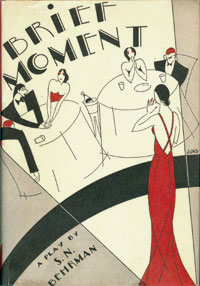|
 |
Brief Moment
S. N. Behrman
New York:
Farrar & Rinehart, 1931
First edition in dust jacket
Inscribed by Behrman |
| |
|
(On front free endpaper)
For my favorite trollope, Ida, / with
much love, / from Berrie / New York: Dec. 1931. |
|
|
Returning from Europe expressly for the
start of the production of Meteor, Behrman learned
that in a crush of despair Daniel Asher had committed
suicide. With the shocking death of his childhood mentor and
the general rejection of Meteor, the society standing
on the brink of the Great Depression, Behrman accepted his
first offer from Hollywood, at twelve hundred fifty dollars
a week. Moreover, Guthrie McClintic picked up the option to
Brief Moment (1931). As the decade drew to a close,
Behrman entered the most successfully productive ten years
of his career. Brief Moment returned Behrman to the
theatrical realm where everyone felt most comfortable with
him: wealthy people moving in an ambiance of high comedy.
Moreover, director McClintic pulled off the casting coup of
the season by offering the role of Harold Sigrift, Roderick
Deanís confidant, to the always astonishing, rapier-witted
Alexander Woollcott. By dint of determination, Abby Fane in
Brief Moment pulls herself up from an ignominous life
as a waitress in Pittsburgh, and becomes the darling of the
nightclub circuit in New York City, singing such blues as
Jerome Kernís "Bill." Millionaire playboy Roderick Dean,
whose wealth is inherited and consequently who flounders
about for a substantial and objective pursuit in life,
proposes marriage to Abby. She accepts, even though it is a
loveless partnership on her behalf. She now becomes the
darling of Cafe Society; invitations to her dinner parties
are eagerly sought. Former lover Cass Worthing returns to
her life, now that Abby is no longer attainable, and,
perhaps not surprisingly, she responds to his amorous
advances. This leads to divorce for the Deans and the
ultimate realization on Abbyís part that her substantial
love for Roderick crept up unawares during their marriage.
At the final curtain they are reconciled. Again, development
is less in the plot than in the slowly growing maturity of
the two leading characters, particularly Abby. By Behrmanís
own assessment, "The play ran though it didnít succeed."
This bantamweight comedy marks a watershed of Behrmanís
easement into the freedom of drawing-room comedy from the
restraint of comedy of manners. Brief Moment
straddles the line of demarcation, wavering more toward the
former than the latter. Imbued once again in the story of
the play are success/achievement, money, love, and marriage
as a business arrangement of convenience (as it appeared
with Clark Storey and Serena Blandish). An incompatibility
exists between father and son. His father is not present in
the text, but Roderick admits that he suffers the handicap
of a Protestant work ethic which an overbearing parent
instilled in him. Like many of his writer contemporaries in
the theatre and literature, Behrman here responds to the
intellectualís surety that a second American revolution
looms just beyond the horizon, a revolution that would
resemble Russiaís uprising, an imminent Red menace. Even
five years thence, the radical Dennis McCarthy brings down
the final curtain in End of Summer (1936) by assuring
the wealthy Leonie: "Donít worry about that [having her
wealth taken away] Ė come the Revolution Ė youíll have a
friend in high office." In Brief Moment, Roderick
assumes a most pessimistic outlook: "Who the hell am I to
strike an attitude? Tomorrow, I may be on a dole from a
Communist Government. Attitudes were all right when life was
stratified into castes and codes Ė but all thatís practical
these days is a kind of opportunism." (Three plays later,
End of Summerís Dr. Rice exemplifies just such
opportunism, and thirty-three years later, But For Whom
Charlieís titular Charles Taney revels in it.) While
change would have been in keeping with Behrmanís liberal
philosophy, his fear of how such change would severely alter
his own very comfortable life-style suggested second
thoughts to any overt action or encouragement on his part.
Yet social change remained an important feature in his work,
and late in life (1967) he became something of a political
activist: "80 Americans Urge U.S. to Seek Mideast Peace."
The New York Times listed Behrman as one of the
petitioners. |
|